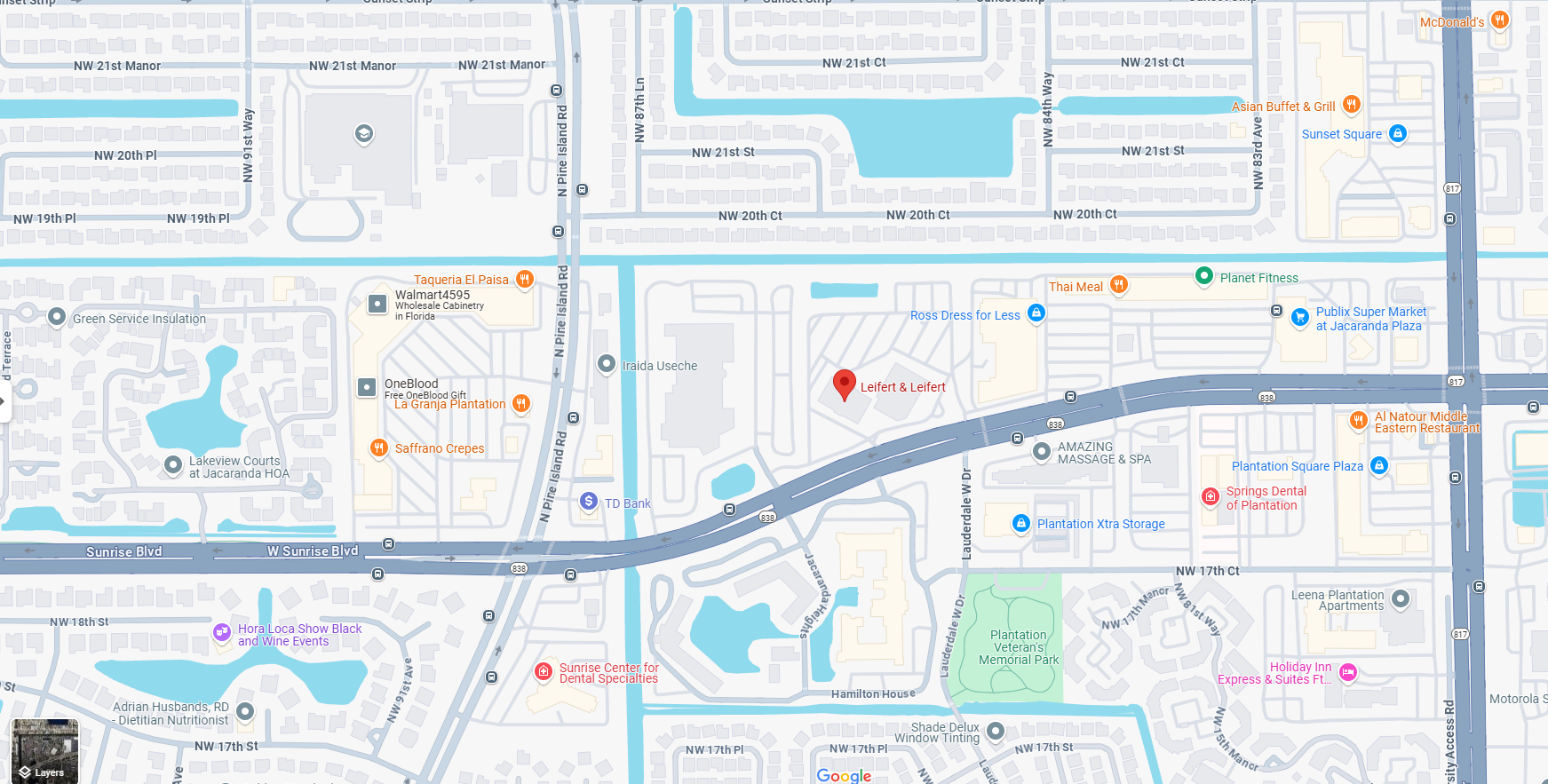Any traffic stop or encounter with law enforcement after you have been driving or in actual physical control of a motor vehicle will subject you to a possible inquiry as to whether you possess the proper faculties to be operating a motor vehicle. If you appear to be impaired or intoxicated, Law Enforcement can detain you, conduct an investigation, and possibly place you under arrest for DUI. Broward County Enforcement Officers set up checkpoints and position themselves in unexpected locations, waiting for one wrong move – any justifiable reason to initiate a stop. Once they are at your vehicle, whether they pulled you over for swerving, speeding, or failing to stop at a sign, they can proceed with a DUI investigation and potential arrest based on your appearance, responses, and performance on physical sobriety tests. When this occurs, a Ft. Lauderdale DUI lawyer should be consulted as soon as possible. An experienced defense Attorney can work to mitigate the consequences of your arrest and protect your rights and driver’s license throughout the legal process.
When Would a Person Be Charged with Drinking and Driving?
In Florida, a person may be charged with DUI in one of two ways. The first occurs when an individual is found operating or in actual physical control of a motor vehicle with a blood alcohol level of 0.08 or above. The second applies when there is no breath or blood test result available, and the State alleges the individual was under the influence of alcohol or drugs to the extent that their normal faculties were impaired. An experienced Ft. Lauderdale lawyer will evaluate the evidence and begin building your DUI defense strategy.
The Initial Traffic Stop
Law enforcement is required to have reasonable suspicion that a traffic infraction or other violation has occurred to make a traffic stop. This means that even if the officer thinks the driver is drunk, they must have more than this to make a stop. Still, a missed turn signal, crossing over the road lines, or other small infractions are enough. Some officers get lazy or forget to identify the reason for the stop. This may present an opportunity for a defense to the entire traffic stop and everything that followed.
Breath Tests During the DUI Stop
If the law enforcement officer believes the driver is under the influence, they may ask the driver to submit to a breath test. This test is designed to measure the driver’s blood alcohol concentration (BAC). A BAC of 0.08% or higher could result in a DUI arrest and charge.
If the defendant refuses to take the breath test, they violate the state’s implied consent law under Florida Statute § 316.1932. Refusal can result in a one-year driver’s license suspension for a first offense and could become a separate misdemeanor charge for a second refusal in a subsequent DUI stop.
Field Sobriety Testing in Ft. Lauderdale
Another method to test for intoxication is a field sobriety test. Some of the most common field sobriety tests include:
- The walk and turn test
- The horizontal gaze nystagmus test
- The one leg stand test
Law enforcement is taught to look for certain signs of intoxication while a driver is performing these tests. Fortunately, these evaluations are known for their inaccuracy and may be challenged in court as a defense against DUI charges.
Challenging the DUI Stop and Arrest
Any abnormalities in the DUI stop or the arrest may create an opportunity for an attorney to defend against these charges in Ft Lauderdale. When presenting a challenge, appropriate evidence and a proper legal strategy are necessary. Potential defenses might include:
- Arguing the reasonable suspicion for the traffic stop
- Demonstrating any errors that were made while the officer was giving field sobriety tests
- Demonstrating issues with chemical testing
- Proving other constitutional violations that may be subject to a suppression motion
A defense uniquely tailored to the defendant’s situation may reveal a successful strategy to reduce or dismiss the charges.
Potential Penalties for a DUI Offense
According to Florida Statutes §316.193, DUI penalties vary by offense. A first conviction may result in a $500 fine and up to six months in jail. A second offense can lead to a $1,000 fine and up to nine months in jail, with a mandatory 10-day jail sentence if within five years of the first. A third conviction carries a minimum $2,000 fine and a mandatory 30-day jail sentence if within 10 years of the second.
In addition to incarceration and fines, individuals may also face ignition interlock requirements, community service hours, substance abuse education, and probation. The conviction will remain on a permanent criminal record, leading to increased insurance premiums, loss of professional opportunities, travel restrictions, and long-term damage to personal and professional reputation.
Beyond these criminal penalties, a DUI conviction in Florida also carries significant driver’s license suspension consequences. For a first offense, the Department of Highway Safety and Motor Vehicles (DHSMV) may impose a license suspension of up to one year. A second offense within five years of the first often results in a mandatory five-year revocation, while a third offense within 10 years of the second can trigger a 10-year revocation. In cases involving serious bodily injury, the suspension period may be even longer.
During the suspension period, you may be eligible for a hardship license, but this typically requires completion of DUI school and approval from the DHSMV. Even after reinstatement, drivers are often required to install an ignition interlock device at their own expense. These administrative penalties can severely impact daily life, making it difficult to commute to work, care for family responsibilities, or meet probation requirements. Because license suspension proceedings are separate from the criminal case, it is important to act quickly to protect your driving privileges.
Step-by-Step DUI Legal Process
After a DUI arrest, the legal process begins with booking and fingerprinting at the police station or jail. You will receive a citation that acts as a temporary license if otherwise eligible for ten days. Next is your arraignment, where charges are formally presented, and we will enter a plea of “not guilty” on your behalf..
During pretrial hearings, one of our Fort Lauderdale DUI Attorneys may file motions to suppress evidence, challenge the stop, or seek dismissal of your DUI case. Some cases may resolve through plea negotiations, but others proceed to trial. If a guilty verdict is returned, sentencing follows, which could include jail, fines, license suspension, or probation. Every stage has implications that can affect your case, which is why early legal counsel is essential.
What Role Does Law Enforcement Play During Trial?
DUI cases often rely on the subjective judgment of the arresting Officer. Officers may testify about your coordination, speech, balance, and other observations. Their opinion about whether your normal faculties were impaired can be crucial in trials where no breath or blood test is available. Unlike objective breath or blood alcohol readings, these cases are based on perception and interpretation—making them more defensible with the help of a skilled Ft. Lauderdale DUI lawyer.
Frequently Asked Questions About DUI Charges
Can I refuse a breath test?
Yes, but refusal can result in an automatic one-year license suspension and may be used as evidence in court.
Will a DUI charge affect my job?
A DUI conviction can appear on background checks and may limit your ability to obtain or keep certain jobs, licenses, or clearances.
What is the difference between DUI with an unlawful blood alcohol level and DUI based on impairment?
A DUI based on an unlawful blood alcohol level involves scientific proof from a chemical test. A DUI based on impairment is built on Officer opinion testimony and observations.
Contact a Fort Lauderdale DUI Attorney
If you have been arrested for driving under the influence, you have a limited window to protect your driver’s license and build a defense. Contact a Ft. Lauderdale DUI Lawyer at Leifert & Leifert today for a free consultation. We can fight on your behalf and help you move forward with confidence.






